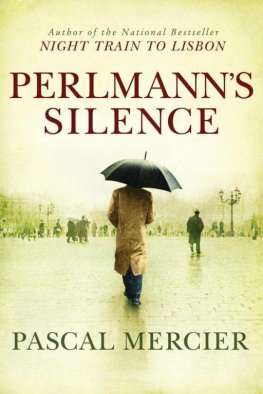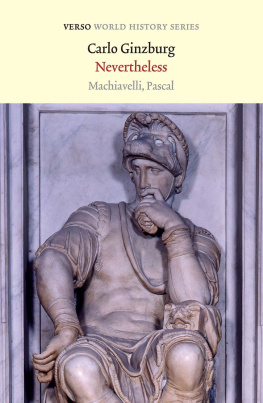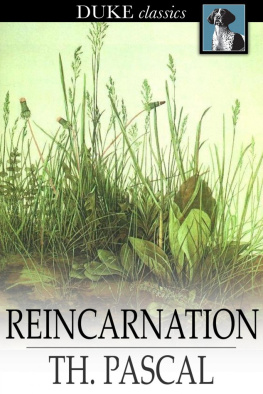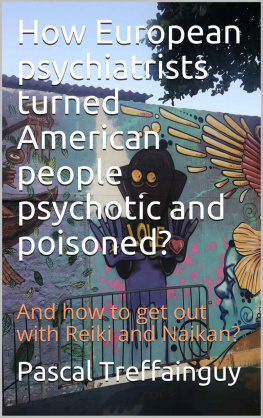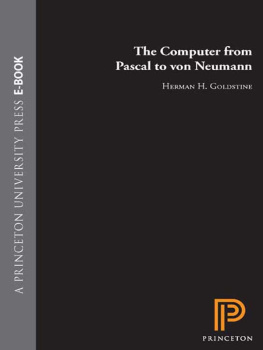Pascal Mercier
PERLMANNS SILENCE
Translated by Shaun Whiteside
The others are really others. Others.
Philipp Perlmann didnt know how to live in the present. He never had. That morning, though, it was worse than usual. He reluctantly lowered his Russian grammar and looked across to the high windows of the veranda, in which a crooked-growing pine was reflected. It was in there, among the gleaming mahogany tables, that it would happen. They would look at him expectantly as he sat at the front, and then, after a prolonged, unbearable silence and a breathless halting of time, they would know: he had nothing to say.
Ideally, he would have left again immediately, without giving a destination, without an explanation, without an apology. For a moment the impulse to flee was as violent as a physical pain. He snapped the book shut and looked across the blue changing cabins to the bay, which was flooded with the gleaming light of a cloudless October day. Running away: at first it must be wonderful; he imagined it as a quick bold rush, headlong through all feelings of obligation, out into freedom. But his liberation wouldnt last long. His telephone at home would ring again and again, and eventually his secretary would be downstairs pressing the doorbell. He wouldnt be able to go into the street or turn on the light. His apartment would become a prison. Of course, it didnt have to be Frankfurt. He could go somewhere else Florence, perhaps, or Rome where no one would be able to find him. But that would turn those cities into hideouts. He would walk through the streets, blind and dumb, before lying in his hotel room and listening to the ticking of his travel alarm clock. And eventually he would have to give himself up. He couldnt disappear for the rest of his life. If only because of Kirsten.
He couldnt come up with a convincing excuse. To give the true reason would be impossible. Even if he could summon the courage, it would sound like a bad joke. It would leave a sense of high-handedness, of wilfulness. The others would feel they were being mocked. Certainly, these people would take control of everything. But I would be finished. Theres no excuse for such things.
The wonderful light which made the still surface of the water beyond the cabins look like white gold was to blame for everything. Agnes had wanted to capture that light, and that was why he had yielded at last to the urgings of Carlo Angelini. And Perlmann found him unlikeable, this wiry, very alert man with the winning smile that was just a little too practiced. They had met on the edge of a conference in Lugano at the beginning of the previous year, when Perlmann was standing by the window in the corridor long after the session had begun. Angelini had spoken to him and Perlmann had welcomed this excuse not to enter the lobby. They had gone to the cafteria, where Angelini had told him about his job with Olivetti. He was thirty-five, a generation younger than Perlmann. He had taken the offer from Olivetti only two years before, after spending some years as a language assistant at the university. His job was to maintain the companys contacts with the universities, and he was able to do so entirely on his own terms, with a considerable budget at his disposal, because his work fell under the rubric of publicity. They had talked for a while about mechanical translation; it had been a conversation like many others. But all of a sudden Angelini had become very lively and asked him if he felt like setting up a research group on a linguistic theme: a small but intensive matter, a handful of first-class people getting together somewhere nice for a few weeks, all at the companys expense, of course.
Perlmann had felt at the time that the suggestion had come far too quickly. Certainly, Angelini had made it plain that Perlmann wasnt a complete stranger to him, but he had known him for little more than an hour. Perhaps one had to risk such bold gestures in Angelinis line of work. In retrospect, Perlmann felt as if his instincts had been warning him even then. He had reacted to the suggestion without enthusiasm and rather lamely, but he had still observed that, in his view, people from different disciplines ought to be represented in such a group. It had been an offhand remark, not properly thought through, and Perlmann hadnt seriously imagined the project coming to fruition. His impression was that everything had been left sufficiently vague and noncommittal, when he had suddenly dashed to the lecture hall.
Perlmann had forgotten that conversation until a few weeks later when a letter came from Angelini, followed almost immediately by a phone call from Olivettis headquarters in Ivrea. Perlmanns suggestion, it suddenly appeared, had proved very popular within the company; particularly, of course, with some colleagues from the research department, but it had also been well received by the directors. They were especially charmed by the possibility of being able to promote a project that had something to do with the companys products, while it also went far beyond it, by taking in questions of general interest, of significance to the whole of society, so to speak. He, Angelini, suggested that the encounter should take place the following year in Santa Margherita Ligure, a spa town not far from Rapallo on the Gulf of Tigullio. They had had meetings there on many previous occasions and everything had always gone very well. The best time for the planned undertaking, he said, would be the months of October and November. It was still mild then, but there were hardly any tourists left. There was a quiet, contemplative atmosphere, precisely what was required for a research group. Where everything else was concerned, as the head of the group Perlmann would have an entirely free hand; particularly, of course, in the selection of participants.
Perlmann bit his lip and felt helpless annoyance rising up within him as he thought back to that conversation. He had allowed himself to be taken unawares by the sonorous, confident voice at the other end, and for no reason whatsoever. He owed this man Carlo Angelini nothing at all. At the time he had been glad that the man had helped him to avoid the conference, but he was also a stranger, and his ambitions meant nothing more to Perlmann than the plans of Olivetti as a whole. Certainly, in the conversation he hadnt agreed to do anything. Quite soberly, he could still have said no. But he had missed the crucial moment, the moment when it would have been quite natural to say, There has been a misunderstanding. I didnt mean it that way. Im sorry, but it really doesnt fit in with my other plans. Im, sure, however, that I have many colleagues who would be more than happy to put your plan into effect. I will think about names. Instead, he had promised to think about the idea. And instead of simply allowing an appropriate period of time to pass and then declining, he had fetched the map. He and Agnes had sat over it and worked out the places that could be easily reached from there: Pisa, for example, and Florence, but also Bologna, of which they were particularly fond. Italy in winter, that was one of Agness pet ideas. She had lots of plans for photographs. She might even try color photography, which she usually considered beneath her. Whatever. At any rate I would like to capture the light of the south, as it is in winter, and this is the opportunity, dont you think? Ill make it sound appetizing to the agency. Ill have to do a bit of persuading, but in the end theyll let me go. Perhaps I could even make a series out of it: The Wintry Light of the South. What do you think? Admittedly, October and November were not exactly winter, but Perlmann didnt want to be pedantic, and some of her enthusiasm had rubbed off on him. It was grotesque, he thought, and pressed his fingertips to his eyes, but at the time he had actually seen himself, above all, in the role of the person who would accompany Agnes on her photographic trip, supported and protected by her ability to conquer the present for both of them. It seemed incredible to him now, but that was how it had been: out of that vision, that daydream, he had finally agreed, had applied for leave from his job and written the first invitations. Ten months later, when Agnes died and everything collapsed, it had been too late to call things off.

